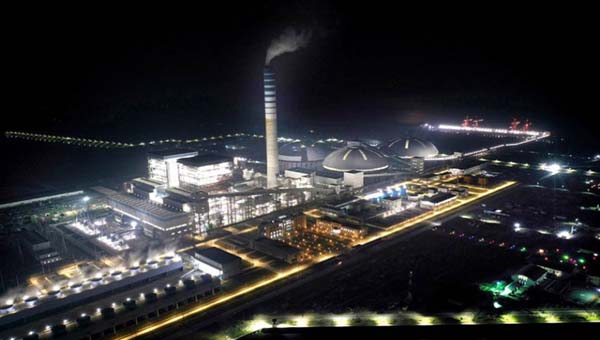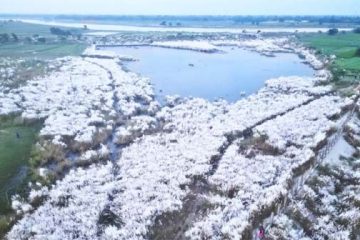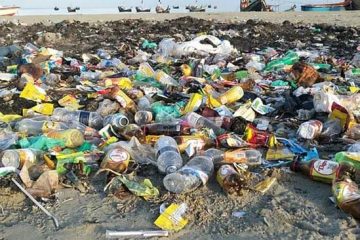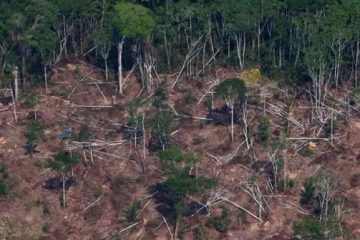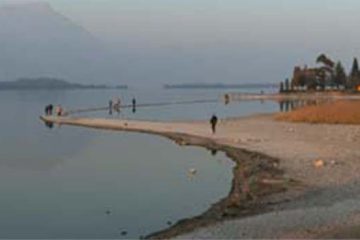Emran Hossain
The government’s latest assessment of environmental and other compliances of the Rampal power plant has revealed rampant violations, exposing lives and nature to the hazards predicted by experts well before the plant’s installment, to which the Sheikh Hasina regime refused to pay heed.
The assessment conducted by the state-owned institution, the Center for Environmental and Geographic Information Services, also revealed that the 1,234MW coal-based power plant had been running without an effluent treatment plant in operation since October 2022, releasing wastewater directly into the Maidara River.
Handling of coal from unloading the fuel from the ship to carrying it along the 25 meter conveyer belt involves no covering at all, releasing coal ash into the air and river, endangering bio-diversity and ecology, the report of the assessment conducted between February and April said.
Facilities such as coal-shed, coal stack yard and ash silo are not yet finished as per the plan. As a result, the environment is being polluted and evidence found during the assessment indicates increases in the concentration of total dissolved solids in water and pollutants such as mercury, nitrate and phosphate levels in some of the study areas.
No bird nest was spotted during the assessment conducted in the project area, including Karamjal, Harbaria, Akram Point, Hiron Point, and Sutarkhali Forest, while vanishing grazing grounds resulted in a drop in the population of domesticated animals, the report said.
The plant’s workers live in horrible conditions with construction materials and waste piled up in the area where they live without any sewerage management system in place, exposed to constant air pollution from the open coal handling.
‘What the CEGIS is saying must be the tip of the iceberg,’ Waterkeepers Bangladesh coordinator Sharif Jamil said.
Experts were surprised by the CEGIS report being so revealing about a project that the institute certified as ‘not environmentally harmful’ in its environmental impact assessment.
The CEGIS went to a great extent to oppose local and global experts to support the Rampal project, a joint venture of Bangladesh and Indian governments, located 14 kilometres north of the world’s largest mangrove forest, the Sunderbans, also a UNESCO world heritage site, the experts reminded.
The CEGIS always manipulated reports seeking to please successive governments, including the Sheikh Hasina regime that was overthrown by a student-led uprising on August 5.
‘We want a transparent assessment of the impacts of the controversial Rampal power project,’ said Hasan Mehedi, member secretary of the Bangladesh Working Group on Ecology and Development, a platform of green activists.
The lack of integrated dust control system and the absence of covering over the coal conveyor belt from the jetty area to the first transportation point allowed the coal ash to be dispersed in the air and nearby water bodies, the report said.
There is no enclosure over the grabber of the excavator as well as it unloaded coal from lighterage, causing air and river water pollution, the report said.
Sand and construction materials were found heaped inside the plant premises and at the labour shed with the roads and lanes around it littered with organic and inorganic waste, the report said.
The concentration of particulate matter, especially PM2.5 and PM10, was found to be higher in the project’s adjacent area than in the other areas, the report said, attributing the existence of the concentration to increased emissions from Power plant activities, and combustion of gasoline, oil, diesel fuel.
Where the mother vessels importing coal anchor and lighterages receive the delivery to take it to the shore, the CEGIS found the concentration of total dissolved solids higher than in other sites.
The levels of nitrate and phosphate, on the other hand, were found to exceed at most of the sites than the standard, the report said, blaming upstream anthropogenic activities.
Similarly, the sulphate concentrations were found relatively higher in the post-monsoon and winter periods than in the monsoon seasons, the report said
The maximum concentration for arsenic and lead was found in Akram point whereas mercury maximized at Harbaria. The points are the places where mother vessels and lighterage gather.
‘Ships carrying coal produce black water containing solid waste. Ships tend to dump the waste directly into the water without proper monitoring,’ said Abdullah Harun Chowdhury, who teaches environmental science at Khulna University.
Harun, who became the subject of a government witch hunt back in 2012 for publishing a scientific article predicting the potential impacts of the Rampal power plant, was not surprised by the absence of ETP or wastewater being discharged into the Maidara River without treatment.
‘It was well in the prediction that steps promised to keep the power plant as clean as possible are not attainable because they will increase production cost,’ he said.
The report said that the flue gas desulfurization for unit-1 of the power plant is ready for operation, implying that it was not used so far. Also known as FGD, the device is used to free coal from sulphur before using it as fuel.
Locals have long alleged that the power plant releases massive black smoke when coal is burned. Locals also alleged developing sicknesses such as problems with their breathing.
Anwarul Azim, deputy general manager of Bangladesh-India Friendship Power Company Limited, the mother company of the Rampal power plant, rejected the finding of the report.
‘ETP was fully operational even before commissioning of Unit-I,’ he said in a written message, adding, ‘The maximum possible length of jetty conveyor is covered.’
He said that both the ETP and sewerage treatment plant are operational.
‘As far as mercury is concerned, we have no source of the pollutant to be discharged to water bodies,’ he wrote.
CEGIS deputy executive director Mostafa Ali, however, said that the ETP became operational after the second last quarter while the STP was yet to be operational.
‘There might be some mistakes in the report,’ he said.
Experts believe the truth is uglier than the picture painted by the CEGIS report. They said that the CEGIS did not point out most of the violations in its previous assessments.
‘The power plant is affecting us economically, ecologically and socially. The loss is far greater than the benefit from generating power in the plant,’ said Harun.
Ever since its construction, Bangladesh could not use even half of the plant’s capacity because of fuel crisis and technical glitches. The power plant gets over Tk 2,000 crore as capacity charge.
‘The power plant should immediately be closed down,’ said Harun.

